The Daily 202: Primary results prove 2018 will be a breakthrough year for Democratic diversity

|
WHILE YOU WERE SLEEPING:
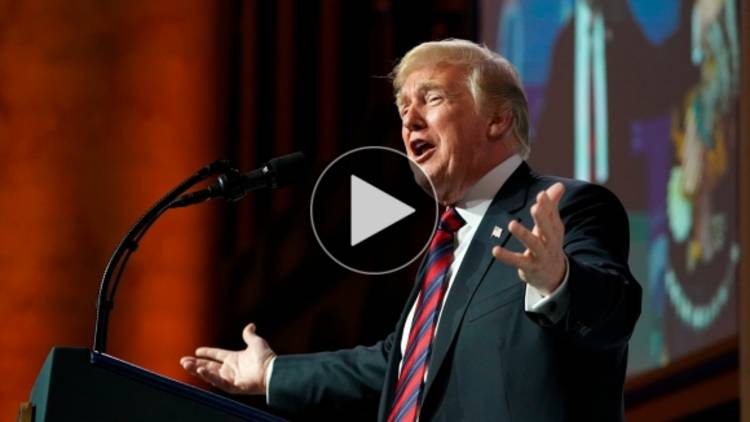 |
| 'Who the hell wrote that line?' Trump takes swipe at speechwriter |
-- A party of one: Trump spoke last night at a gala for the antiabortion group Susan B. Anthony List. Reading from a teleprompter, he declared: “Your vote in 2018 is every bit as important as your vote in 2016.” Realizing what he had just read, Trump cut himself off. “Although I’m not sure I really believe that,” he said, referring to the fact that his name won’t be on the ballot. “I don’t know who the hell wrote that line.” The audience laughed. “But it’s still important,” Trump said. “The story is, ’18 midterms, we need Republicans.”
“In classic Trump fashion, the president veered often to off-topic chatter,” Seung Min Kim reports. “He previewed a new round of tax cuts that he said he will put forward before November … Trump also openly mulled changing some Senate terms, which run for six years, to just two years. … And last week, the administration announced that it plans to bar clinics that perform abortions from receiving federal family-planning funds — a proposal that Trump promoted at the gala Tuesday night.”
THE RECKONING:
-- “Prominent Southern Baptist leader Paige Patterson has been removed from his job as president of Southwestern Baptist Theological Seminary amid an evangelical #MeToo moment: a massive backlash from women upset over comments he made in the past that are being newly perceived as sexist and demeaning,” per Bobby Ross Jr., Sarah Pulliam Bailey and Michelle Boorstein. “In a brief statement made to press early Wednesday, the seminary’s board of trustees made him president emeritus but did not state a reason for his removal. After 13 hours of behind closed door sessions, the seminary’s trustees appointed D. Jeffrey Bingham, the seminary’s dean of the school of theology, as interim president.
“In recent weeks, Patterson, 75, has come under fire for taped comments he made between 2000 and 2014 about women, including remarking on a teenage girl’s figure and saying female seminarians need to work harder to look attractive. He also said women who are abused almost always should stay with their husbands. The Washington Post also reported Tuesday that Patterson allegedly told a woman who said she had been raped that she should not report her allegations to the police and encouraged her to forgive her alleged assailant. … Patterson has been widely revered for his role starting in the 1970s in a conservative takeover of the Southern Baptist Convention, which claims 15 million members.”
-- Australian archbishop Philip Wilson was convicted of failing to act on reports of child sex abuse for decades, making the 67-year-old the most senior Catholic leader to ever be held accountable for concealing abuse. Wilson, who now has Alzheimer’s disease, faces up to two years in prison. (Amanda Erickson)
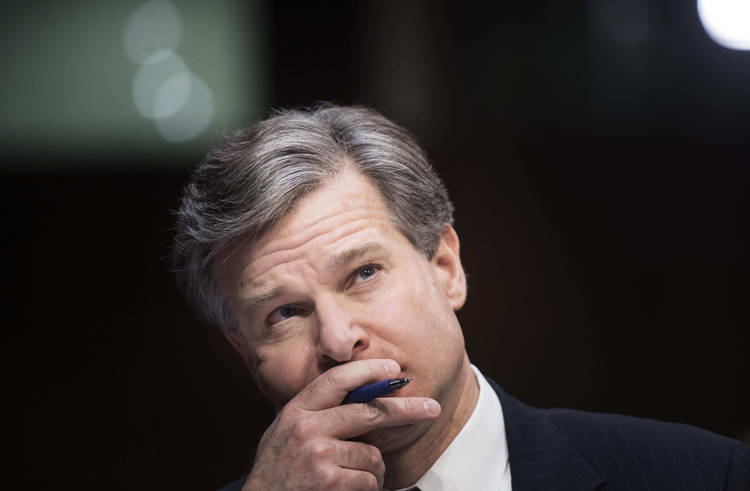
FBI Director Christopher Wray appears before the Senate Intelligence Committee. (Melina Mara/The Washington Post)
GET SMART FAST:
- The FBI grossly overstated the number of encrypted cellphones inhibiting investigations, with FBI Director Christopher Wray repeatedly claiming that investigators were locked out of nearly 7,800 devices last year. In reality, the correct number was likely between 1,000 and 2,000. The bureau blames a software error for the misleading statements. (Devlin Barrett)
- Amazon has been providing a facial recognition tool known as Rekognition to law enforcement agencies in Oregon and Orlando,prompting concern among civil rights groups who say use of the technology could lead to expanded surveillance of vulnerable communities. (Elizabeth Dwoskin)
- A federal judge in Virginia sided with a transgender teenager who spent most of his high school years fighting to use the boys’ bathroom, ruling that school officials violated his constitutional rights. The decision comes nearly a year after Gavin Grimm graduated, but it could provide leverage for other transgender students seeking to use bathrooms that align with their gender identity. (Moriah Balingit)
- A woman will lead the New York Stock Exchange for the first time.Stacey Cunningham’s elevation is significant because none of the biggest Wall Street banks (JPMorgan Chase, Bank of America, Goldman Sachs, Morgan Stanley and Citigroup) have ever been led by a woman. (Jena McGregor)
- Venezuelan President Nicolás Maduro ordered the expulsion of two top U.S. diplomats from Caracas, in retaliation for a new round of sanctions over his widely condemned reelection. (Reuters)
- Don Blankenship, the felon and coal baron who lost the GOP primary for West Virginia Senate, announced he will run as the nominee of the Constitution Party. (Steven Mufson)
- Fresh from Hurricane Harvey’s flooding, Houston is starting to build again — but in the flood plain! (Scott Wilson)
- A new Federal Reserve report found that about 40 percent of American adults said that, if faced with a $400 unexpected expense, they would either not be able to pay it or would do so by selling something or borrowing money. (CNBC)
- A 30-year-old New York man demanded six months’ notice for eviction from his parents’ house. A judge called his lawsuit “outrageous.” (Marwa Eltagouri)
- Author Philip Roth died at 85 of congestive heart failure. (Nelson Pressley’s obituary)
- A New York lawyer who threatened to “call ICE” on Spanish-speaking deli employees has issued an apology after a video of his tirade went viral and prompted accusations of xenophobia. “To the people I insulted, I apologize,” Aaron Schlossberg wrote on Twitter and LinkedIn. “Seeing myself online opened my eyes — the manner in which I expressed myself is unacceptable and is not the person I am.” (Eli Rosenberg)
- Two men facing trial for brutal murders have escaped from a South Carolina jail, after a power outage caused their cell doors to automatically open. Their escape has triggered a massive manhunt. A similar malfunction occurred at the same facility just last month. (Avi Selk)
- Government investigators are trying to quell speculation over Malaysia Airlines Flight 370, insisting the plane vanished by accident and not as the result of a premeditated murder-suicide.The back-and-forth comes after a panel of aviation experts appeared on the Australian edition of “60 Minutes” to posit a new theory about what happened — reigniting intense debate four years after its disappearance. (Cleve R. Wootson Jr.)
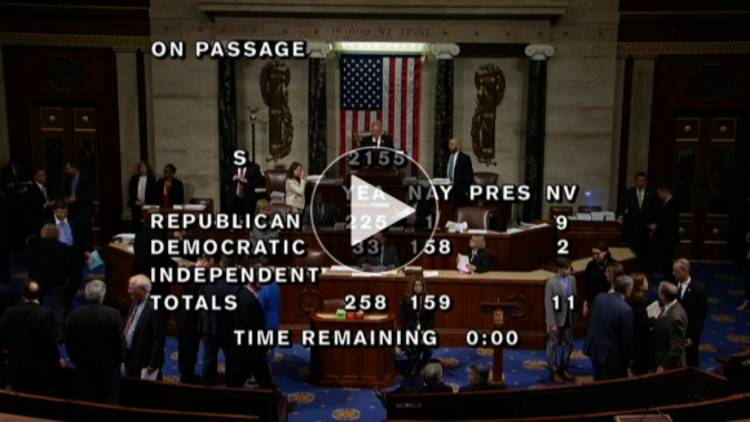 |
| Congress passes rollback of banking rules, sending bill to Trump to sign |
WATCH WHAT THEY DO, NOT WHAT THEY SAY:
-- The House passed a plan to roll back banking regulations passed in response to the 2008 financial crisis, sending the bill to Trump to sign. From Erica Werner and Renae Merle: “The measure leaves the central structure of the post-financial-crisis rules in place, but it would make the most significant changes to weaken the Dodd-Frank banking regulations since they were passed in 2010. It would exempt some small and regional banks from the most stringent regulations, and also would also loosen rules aimed at protecting the biggest banks from sudden collapse. The measure is nearly certain to become law after its passing in the House, 258 to 159, on Tuesday with nearly all House Republicans and 33 Democrats voting for it. The Senate approved the bill in March with bipartisan backing, and White House officials said that Trump plans to sign it in the coming days.”
-- The House also passed “right to try” legislation that would allow people with life-threatening illnesses to bypass the Food and Drug Administration to obtain experimental medications, ending a drawn-out battle over access to unapproved therapies. From Laurie McGinley: “Trump is expected to quickly sign the measure, which was praised by supporters as a lifeline for desperate patients but denounced by scores of medical and consumer groups as unnecessary and dangerous. The Senate passed the bill in August, and the House approved its own version in March. That version was less objectionable to the medical groups, but then the legislation got bogged down. With the White House demanding action, House leaders in recent days decided to short-circuit the process by taking up the Senate-passed bill. The vote was 250 to 169.
“The measure, championed by Sen. Ron Johnson (R-Wis.), is designed to give patients an alternative way to obtain drugs not approved by the FDA. The FDA would be largely left out of the equation under the new legislation and would not oversee the right-to-try process. Drug manufacturers would have to report ‘adverse events’ — safety problems, including premature deaths — only once a year. The agency also would be restricted in how it used such information when considering the experimental treatments for approval.”
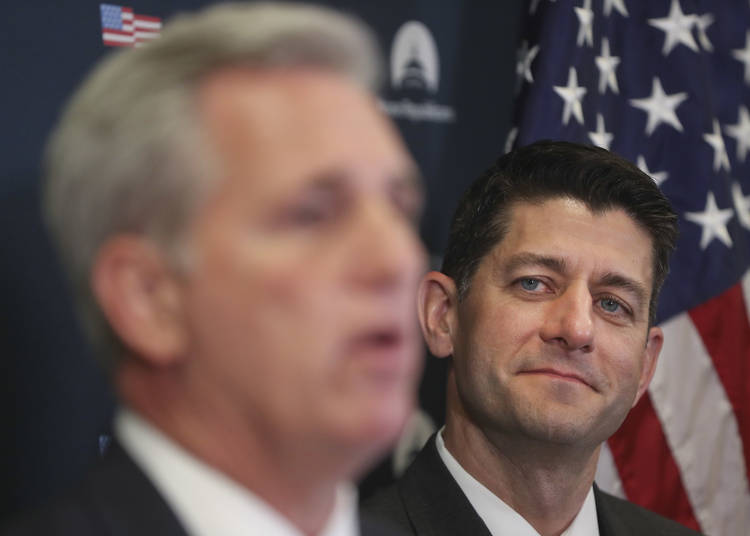
House Speaker Paul Ryan listens to House Majority Leader Kevin McCarthy speak to members of the media. (Pablo Martinez Monsivais/AP)
PALACE INTRIGUE:
-- Paul Ryan is losing his grip on the House speakership, but numerous aides and lawmakers say there is no viable alternative who can win enough support within the GOP for a clean transition before November — and there is little stomach at the moment for the messy battle that would ensue when Ryan departs. Mike DeBonis reports: “Ryan’s preferred successor is Majority Leader Kevin McCarthy (R-Calif.), who helped recruit dozens of sitting Republican lawmakers and enjoys a close relationship with President Trump. Two senior Republicans who spoke on the condition of anonymity to describe their view said it would be preferable if McCarthy could take the reins immediately and move to assert more control over the party’s legislating and fundraising.
“Multiple Republicans said this week that the only factor that could accelerate Ryan’s departure is intervention from Trump, who is caught between his friendship with McCarthy and conservative allies who want to force a race. For now, the White House is not convinced that Ryan staying as speaker through the end of this term is a tenable situation, one senior White House official said. But the White House has made a concerted effort to stay out of the race to replace Ryan since he announced his retirement last month, believing there is no upside for Trump to weigh in on the matter.
“The next front in the internal GOP battle will play out of the coming weeks as the immigration issue comes to a head. Twenty Republicans have signed a 'discharge' petition to force a debate, which could come as soon as June 25, on a series of immigration bills — including some bills that Democrats support and conservatives hate. Its backers, which include Republicans in Democratic-friendly districts, said Tuesday that they expect to have enough signers by the end of the week. To sidestep that possibility, top GOP leaders said this week that they plan to bring up immigration bills the week beforehand, but there are widespread doubts that they will be able to craft a bill that could pass the House with a majority of Republicans supporting it.”

Rudy Giuliani talks with reporters at Trump Tower. (Jabin Botsford/The Washington Post)
TRUMP'S WAR ON THE SPECIAL COUNSEL:
-- Just two Republican lawmakers will be allowed to review classified information at the Justice Department on Thursday about FBI source Stefan Halper, who aided the investigation into the Trump campaign. Karoun Demirjian and Matt Zapotosky report: “Press secretary Sarah Huckabee Sanders announced at a White House press briefing that House Intelligence Committee Chairman Devin Nunes (R-Calif.) and House Oversight Committee Chairman Trey Gowdy (R-S.C.) would be the only two lawmakers at the meeting, which would also include FBI Director Christopher A. Wray, Director of National Intelligence Daniel Coats and Principal Associate Deputy Attorney General Ed O’Callaghan. Sanders said no White House officials would attend, even though Chief of Staff John F. Kelly brokered the gathering. She said Democrats were cut out because they had not requested the same materials that their Republican colleagues had.”
-- The move stoked consternation in Congress: “Rep. Adam B. Schiff (Calif.), the ranking Democrat on the Intelligence Committee, said previously that he expected to be invited and said Democrats being shut out was 'another serious abuse of power.' Schiff said that Nunes 'refuses' to take briefings from administration officials alongside panel Democrats, but in the past, Democrats have been offered identical briefings. He dismissed Sanders’s argument that Democrats had not asked for the briefing, saying Democrats had a 'standing request' with the department that 'any briefing the Department of Justice or FBI gives on the Russia investigation be given to us as well.' The matter’s sensitivity is such that Senate Intelligence Committee Chairman Richard Burr (R-N.C.) and Vice Chairman Mark R. Warner (D-Va.) had turned down previous offers for a briefing about the source, Warner’s spokeswoman confirmed, over concerns that the classified information might leak from Capitol Hill.”
Meanwhile, Trump ramped up his attacks on the FBI this morning:
 |
-- Trump’s legal team is seeking to narrow the scope of the president's potential interview with special counsel Robert Mueller to include only questions about Russian interference before the election. CNN’s Gloria Borger, Evan Perez and Dana Bash report: “Ultimately, their success depends on Mueller's willingness to cut a deal — and there is no indication so far that he'd be open to any such proposal. ‘We said we wanted the questions limited to Russian collusion,’ one of the sources [said]. Since that aspect of the investigation deals with the Trump campaign and transition team's interactions with Russians, it would exclude questions about Trump's actions once in office. And even within the pre-presidency category, Trump's lawyers want to narrow what questions the prosecutors can ask. The focus on Trump's conduct prior to assuming the presidency also would exclude questions about the firing of [James Comey] and possible obstruction of justice.”
-- Rudy Giuliani opposes letting Trump be interviewed by Mueller, bluntly acknowledging the possibility the president could “talk himself into becoming a target.”The Wall Street Journal’s Peter Nicholas reports: “Other people close to Mr. Trump’s legal team have voiced a similar view, worried that the president’s informal style and penchant for lengthy answers could expose him to legal jeopardy when taking questions from seasoned prosecutors. ‘If they said, you have to do it now, the answer would have to be no,’ said Mr. Giuliani. … Should Mr. Trump choose to testify, Mr. Giuliani said he would want the sit-down interview to take place in mid-July. He said he would likely prepare Mr. Trump on weekends at the president’s golf club in Bedminster, N.J. and may recruit help from [Chris Christie], who Mr. Giuliani said was helpful in prepping the president for debates [against Hillary Clinton]."
-- A former business partner of Trump personal lawyer Michael Cohen, known as New York’s “Taxi King,” has pleaded guilty to tax evasion and agreed to cooperate with federal investigators as a potential witness — a development that could increase pressure on Cohen to flip as well. Rosalind S. Helderman reports: “[Russian immigrant] Evgeny ‘Gene’ Freidman … is a former business partner of Cohen who managed taxis owned by the president’s lawyer for several years. Cohen entered the taxi business as a young lawyer in the 1990s, buying up valuable taxi medallions … By 2003, Cohen owned a fleet of 200 taxi cabs, working in partnership with a Ukrainian immigrant named Simon Garber. The value of a taxi medallion reached a high of $1.2 million each in 2014, but their value has slumped to about $300,000 amid the rise of ride-hailing services such as Uber. Freidman struggled financially as the value of taxi medallions plummeted. He declared bankruptcy on some of his medallions in 2016 … State prosecutors said Tuesday that Freidman, who operated 800 taxis between 2012 and 2015, failed to remit a 50-cent-per-ride tax owed to the state. Instead, he filed false tax returns designed to hide the theft, they said. During that period of time, he was operating taxis controlled by Cohen …”
-- DHS Secretary Kirstjen Nielsen dubiously claimed that she was unfamiliar with the U.S. intelligence community’s conclusion that Russia interfered in the 2016 election with the intention of helping Trump. Politico’s Kyle Cheney and Martin Matishak report: “’I do not believe that I’ve seen that conclusion that the specific intent was to help President Trump win,’ she told reporters at the Capitol. ‘I’m not aware of that.’ But just hours after Nielsen's remarks began making the rounds — drawing rebukes from Democrats — the Department of Homeland Security issued a lengthy statement emphasizing that Nielsen ‘has previously reviewed’ the intelligence community's assessment ‘and agrees with it.’”
-- Voters do not want to shut down the Mueller investigation, and the most effective argument for not doing so is that the special counsel has already secured 22 indictments or guilty pleas. That’s the conclusion of Navigator Research, the new Democratic polling consortium I wrote about last month, and its second batch of monthly research into the language, frames and arguments progressives can use to win on issues of the day. The pollsters from Global Strategy Group and GBA Strategies warn that only 41 percent of Americans know the Mueller investigation has already uncovered anything. (Read their summary memo here and the toplines here.)

Press secretary Sarah Huckabee Sanders speaks during the daily news briefing. (Carolyn Kaster/AP)
TRUMP VS. THE FOURTH ESTATE:
-- Trump has demanded a “housecleaning” of his White House communications team in an effort to crack down on leaks. Politico’s Eliana Johnson, Andrew Restuccia and Nancy Cook report: “[John Kelly] signed off on a plan that would flush out some of the department’s mid-level and junior aides, according to three people familiar with the situation. [Sarah Huckabee Sanders] and other key senior officials are expected to remain, these people said. Though changes to the structure of the White House communications office had been under consideration for months, sparked by concerns about a lack of organization in the office, the recent leak of a junior staffer’s callous remarks about Arizona Republican Sen. John McCain’s health served as a breaking point that moved the president to action. ... Trump spoke to the staffer, communications aide Kelly Sadler, during a meeting earlier this month in which he asked Sadler and others present to identify leakers in the communications shop … It remains unclear when the shake-up will take place, and plans remain fluid, though some expect it in the coming weeks.”
-- Top GOP fundraiser Elliott Broidy has subpoenaed the Associated Press for information about the source of his hacked emails — setting up a potential legal showdown with the news organization, which plans to resist it. Politico’s Ben Schreckinger reports: “A copy of the subpoena [demands] the AP turn over all its information about its sources, including their names, along with information about how the AP obtained the hacked emails. While several outlets … have published articles based on Broidy’s stolen emails, the businessman is singling out the AP for a subpoena because of the lengths the outlet has gone to conceal the identity of its sources … Still, federal law prevents the enforcement of subpoenas of news organizations unless the information is crucial to a case and those seeking the information have exhausted all other means of obtaining it, according to Douglas Mirell, a media lawyer at Greenberg Glusker in Los Angeles. For that reason, Broidy faces an uphill battle in convincing a court to implement his subpoena, Mirell said.”
-- EPA officials barred reporters from three news outlets from covering a meeting that was attended by other journalists and allegedly shoved one out of the building. Paul Farhi reports: “The incident occurred at a summit on water contamination at the EPA’s headquarters [called by] Scott Pruitt. Reporters from CNN, the Associated Press and the energy and environment publication E&E News were prevented from attending the meeting ... AP reporter Ellen Knickmeyer tweeted that EPA guards grabbed a reporter by the shoulders and ‘shoved’ the journalist out of the building. (An EPA spokesman) said not all journalists who sought entry could be accommodated. … [But] by midafternoon, the EPA reversed course and permitted Knickmeyer to cover the conference’s afternoon session. Knickmeyer said that an adviser to Pruitt called to apologize to her and that officials were looking into the shoving incident[.]”
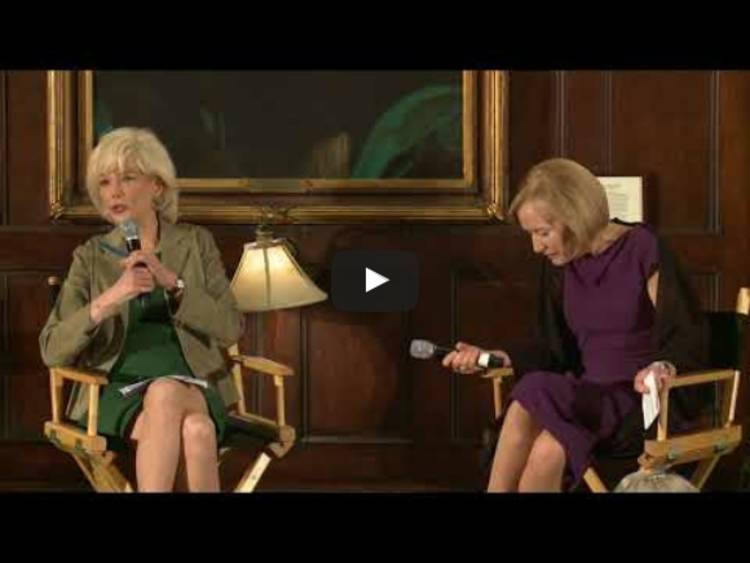 |
| Deadline Club Awards 2018 Dinner Conversation with Judy Woodruff and Lesley Stahl |
-- Lesley Stahl, the “60 Minutes” correspondent, says Trump admitted to her that he attacked the press as part of a strategy to discredit reporters and news organizations to shield himself from negative coverage. Eli Rosenberg reports: “Stahl made the disclosure on Monday during an interview with Judy Woodruff of ‘PBS NewsHour’ at a journalism award presentation in New York. … Woodruff asked Stahl about her November 2016 interview with Trump — his first after the election victory. Stahl described going to meet with him at Trump Tower before the interview ... After Trump began to unload on the news media, she said, she asked him whether he planned to stop attacking the press — a hallmark of his campaign — now that he had been elected. ‘I said, you know that is getting tired, why are you doing this — you’re doing it over and over and it’s boring,’ Stahl said. ‘He said you know why I do it? I do it to discredit you all and demean you all, so when you write negative stories about me no one will believe you.’ ‘He said that,’ Stahl said, raising her eyebrows. ‘So put that in your head for a minute.’”
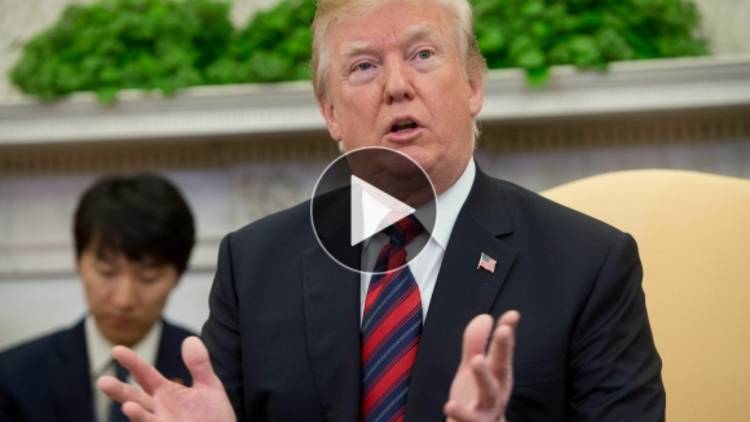 |
| Trump: North Korean summit could be postponed |
THE NORTH KOREA SUMMIT:
-- As Trump met with South Korean President Moon Jae-in at the White House on Tuesday, he acknowledged a “substantial chance” the scheduled June 12 meeting with North Korea's Kim Jong Un will fall through, David Nakamura, Carol D. Leonnig, John Hudson and Ashley Parker report: “’We’re moving along. We’ll see what happens,’ Trump told reporters[.] ‘If it doesn’t happen, maybe it will happen later.’ … ‘There are certain conditions we want, and I think we’ll get those conditions,’ Trump said, though he did not offer details. ‘If we don’t, we won’t’ hold the summit, he said.
“The president also attempted to reassure Kim that he would remain in power under [a denuclearization deal]: ‘I will guarantee his safety, yes,’ Trump said. ‘He will be safe, he will be happy, his country will be rich, his country will be hard-working and prosperous.’ If Kim strikes a deal, Trump added: ‘He will be able to look back and be very proud of what he did for North Korea and, actually, for the world.’" The South Korean government, striking an optimistic tone, said “there is a 99.9 percent chance” the summit will go ahead as scheduled.
Meanwhile, Trump’s top aides including Deputy Chief of Staff Joseph Hagin and deputy national security adviser Mira Ricardel are preparing to travel to Singapore for a critical planning meeting with North Korean officials this weekend, my colleagues report: “Their trip comes less than two weeks after a North Korean delegation failed to show up for a similar planning meeting with U.S. officials in the island country, a failure that raised red flags at the White House, according to people familiar with the situation, who spoke on the condition of anonymity because of the sensitivity of the process … The North Koreans have sent signals to U.S. officials that Kim is skittish about logistical concerns [for the summit], including ensuring that his plane would be able to access enough fuel for the 6,000-mile round trip flight and safeguarding his security while on the ground in Singapore, according to the people familiar with the deliberations. Among other things, Kim purportedly is concerned that a trip so far from home could expose him to a military coup or other internal attempts to unseat him, the sources said.”
-- “Now the question is how Mr. Trump will redefine success, if the summit meeting actually takes place as planned,” the New York Times’s Motoko Rich writes:
- “[Some experts say] Mr. Trump’s desire for a quick, tweetable triumph could leave room for professional diplomats and nuclear experts to hammer out a longer-term agreement … ‘He will come out and say ‘where is my peace prize?’’ said Suzanne DiMaggio, a [senior fellow at New America], who has been involved in unofficial talks with North Korea. “He really just wants to emerge from the summit as saying ‘I got them to do what no other president could,’ and I think then he will probably lose interest.’
- “Mr. Kim may also use the talks with Mr. Trump to call for scaling back the number of American troops in South Korea. It would be a mistake to concede that right away, analysts said.” “If you just sign a treaty because it sounds Nobel Peace Prize-worthy, but you don’t address the threat, then you’ve created a more dangerous situation,” said Bruce Klingner, a specialist in Korean and Japanese affairs at the Heritage Foundation.
SOCIAL MEDIA SPEED READ:
A sinkhole opened up on the White House lawn yesterday:
 |
It's been growing all week, Voice of America's Steve Herman tweeted:
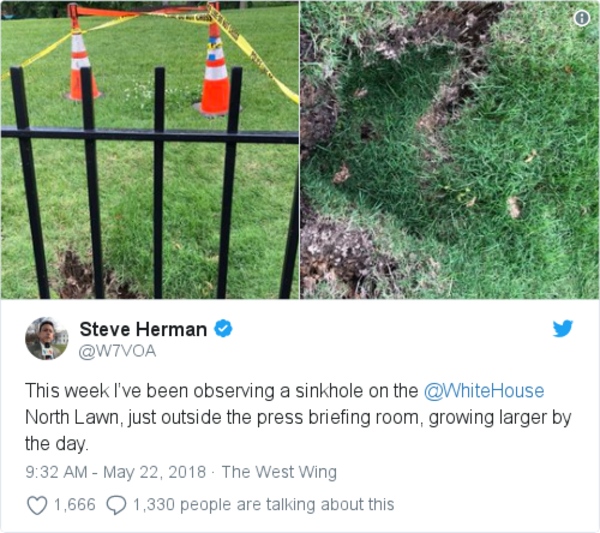 |
Cue the jokes. From a HuffPost reporter:
 |
From CNN's Jim Acosta:
 |
Eventually it was covered:
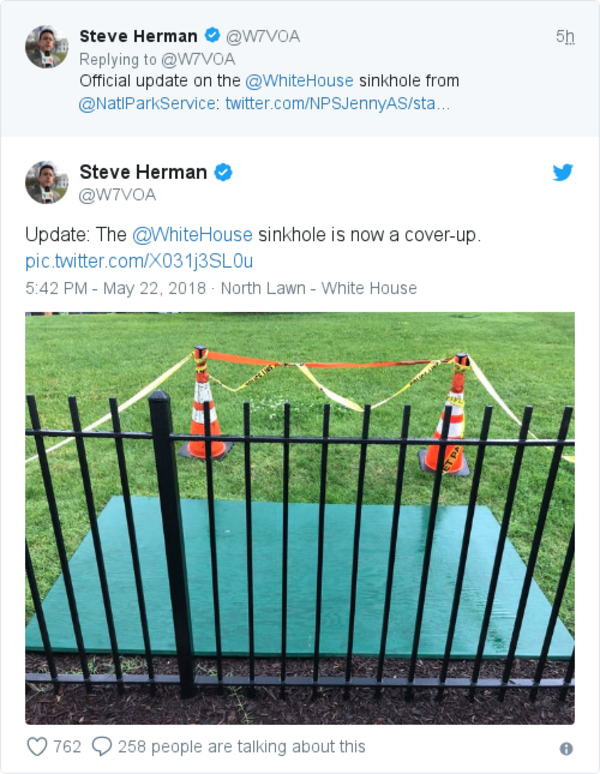 |
A former George W. Bush speechwriter questioned Trump's North Korea strategy:
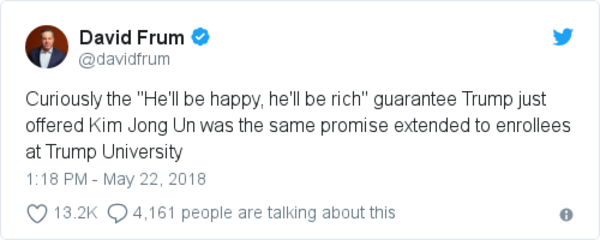 |
Sen. Chuck Schumer wants Kim off the White House's commemorative coin:
 |
From a Post book critic:
 |
A throwback from the Chicago Tribune's Ray Long:
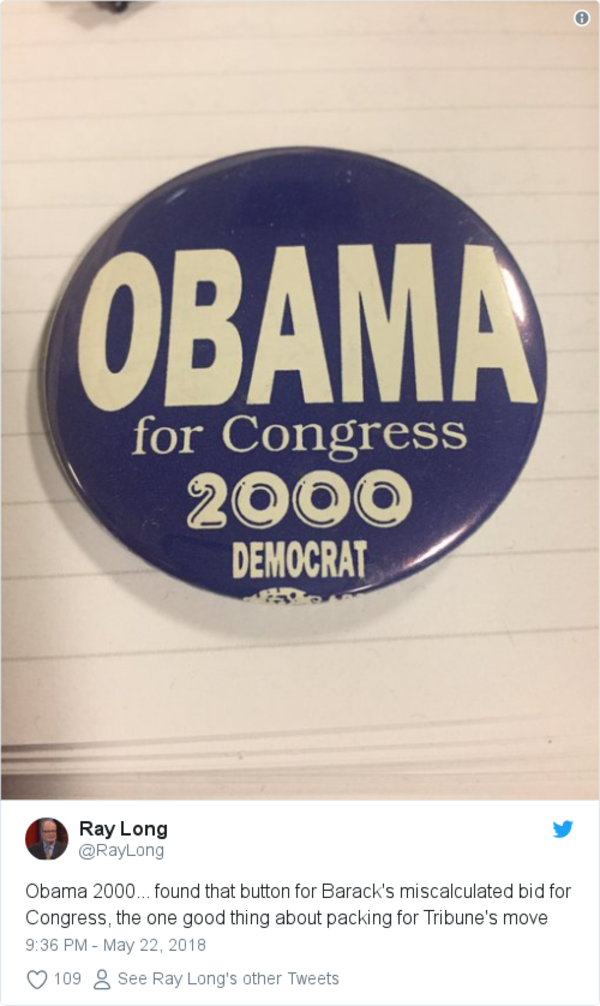 |
GOOD READS FROM ELSEWHERE:
-- Politico Magazine, “When the CIA Infiltrated a Presidential Campaign,” by Steve Usdin: “Trump’s allegations about FBI surveillance may be baseless. But it actually happened to Barry Goldwater.”
-- New York Times, “‘Almost No One Agrees With Us’: For Rural Students, Gun Control Can Be a Lonely Cause,” by Jack Healy: “The teenagers in rural Kentucky decided they were fed up after a 15-year-old with a handgun turned their high school into another killing ground, murdering two classmates. Like so many other students, they wrote speeches and op-ed essays calling for gun control, they painted posters and they marched on their State Capitol. The blush of activism made them feel empowered, even a little invincible. Then came the backlash. It started with sideways looks and laughter from other students in the hallways, they said. Friends deleted them from group chats and stopped inviting them over. On social media, [people said] they should have been the ones to die … Speaking out in a place like Marshall County, Ky., carries a price — measured in frayed friendships, arguments with parents and animosity within the same walls where classmates were gunned down.”
-- New York Times Magazine, “The Risky Business of Speaking for President Trump: Flacks in this White House press office are getting enormous exposure — but potentially at a long-term cost to their credibility,” by Mark Leibovich. “To speak for any White House is a delicate exercise even in the best of circumstances. You’re trying to relay a president’s message while also disseminating little actual information; you’re taking abuse from the press while trying, theoretically, to assist them; you’re selling the president’s agenda while not stealing too much of his spotlight. Also, be careful: Your words can move markets, offend entire religions and trigger international incidents — or, in this case, trigger the ‘audience of one’ tuned in to his surrogates from upstairs. But speaking for President Donald J. Trump presents a particular set of challenges. In [White House deputy press secretary Hogan] Gidley’s case, it means saying things that Gidley might normally not be inclined to say, or defending things he might normally have a hard time defending, or offending people in ways that might defy his otherwise pleasing nature. But Gidley is willing to do it[.]”
HOT ON THE LEFT:
“The Trump administration’s bogus spin that it obtained $2 billion for ‘school safety,’” by WaPo Fact Checker Glenn Kessler: "(Mike) Pence and Trump have been rather misleading with the funding for school security in the omnibus bill. More than 60 percent of the money comes from a pot that is mostly devoted to a well-rounded education or technology, not school safety — and it’s an Obama-era program the administration wanted to zero out. The administration’s spin earns Four Pinocchios.”
|
HOT ON THE RIGHT:
“USC under federal investigation for anti-male discrimination,” fromCampus Reform: “The U.S. Department of Education is officially investigating allegations that [USC] excludes male students from certain educational opportunities. The Title IX investigation was launched in response to complaints submitted by a USC professor whose efforts have already instigated a similar investigation into Yale University.”
|
DAYBOOK: Trump leaves the White House around noon for a day trip to New York. He’ll lead an immigration roundtable at the Morrelly Homeland Security Center and then hold a fundraiser at the Lotte New York Palace Hotel. He’s back by 8:45 p.m.
QUOTE OF THE DAY:
In the days following the school shooting in Parkland, Fla., a group of unarmed volunteers known as the “Guardian Angels” started patrolling the campus every day to help students feel safe. Parents say the Angels — who each don identical, bright red jackets — spend their time walking or biking the grounds, escorting students upon request, and otherwise helping the traumatized teens feel secure. “If anything happens in that school, I’m coming in that door,” said David “Cobra” Clemente, a 300-pound longtime security officer. “Anybody who looks like they don’t belong there is going down on the floor, I’m taking them down. We watch everything. We’d protect these students with our lives.” (Allison Klein)
|
NEWS YOU CAN USE IF YOU LIVE IN D.C.:
-- Enjoy today’s great weather ... while it's here: The Capital Weather Gang reports that it'll be partly sunny with highs around 80 degrees, offering this calculation: “Increasing sun + decreasing humidity = solid spring day.” While the forecast shows nice weather until Friday, showers may return for this upcoming holiday weekend.
-- AAA expects record volume on the roads for Memorial Day weekend. More than a million D.C.-area residents are expected to be traveling at least 50 miles on the road, in a plane or on trains and cruise ships this holiday weekend. (WTOP)
-- Michael A. Taylor hit a ninth-inning double to lift the Nationals to a 2-1 win over the Padres. (Chelsea Janes)
-- Maryland gubernatorial candidate Alec Ross is urging the state Board of Elections to reconsider its decision not to list his rival Valerie Ervin on the ballot next month. The Post's Ovetta Wiggins reports that Ervin was a candidate for lieutenant governor who filed to run for governor after the death of her running mate Kevin Kamenetz – but was then told there wasn’t enough time to reprint the 3.5 million ballots before voting begins in mid-June. Ross insists there is enough time and that not reprinting the ballots “calls the integrity of the election in question.”
VIDEOS OF THE DAY:
Amy McGrath’s two-minute introductory bio spot was probably the best ad I saw in 2017. This helped propel her from a 47-point deficit in a poll last year to victory in Kentucky last night:
 |
| Amy McGrath: 'Told Me' | Campaign 2018 |
Stephen Colbert says this isn't your grandfather's constitutional crisis:
 |
| This Isn't Your Grandfather's Constitutional Crisis |
Seth Meyers does a “check in” on fired Trump aides:
 |
| The Check In: Fired Trump Aides and Officials |
Betsy Devos says schools should decide whether to report undocumented students:
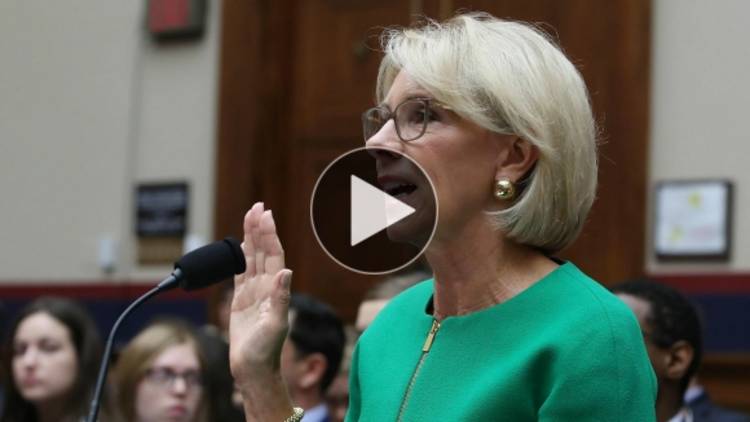 |
| Devos says schools should decide whether to report undocumented students |
Fact Checker: Has the administration obtained $2 billion for “school safety”?
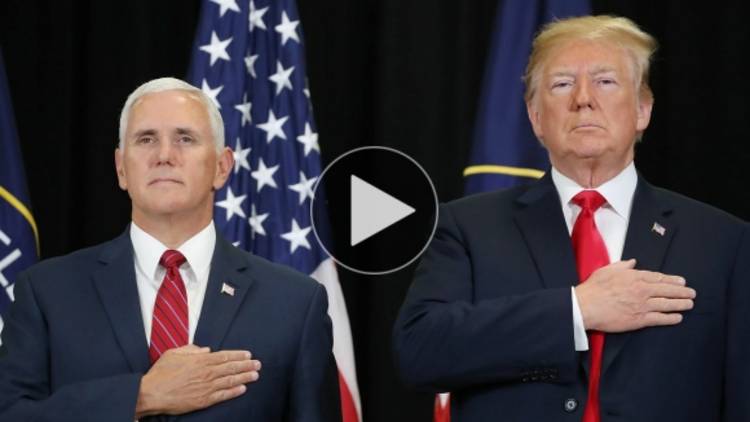 |
| Fact Checker | Has the administration obtained $2 billion for 'school safety'? |
It's never too late to face a fear:
 |
Turn the sound on for what is a confusing but relatable exchange between two lynxes:
 |
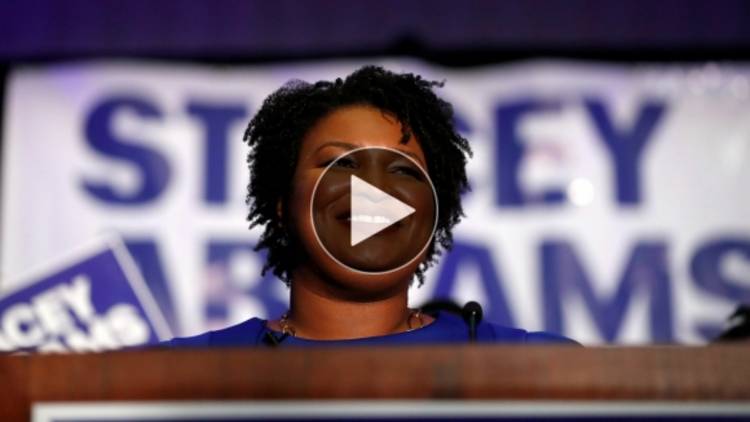



Comments
Post a Comment